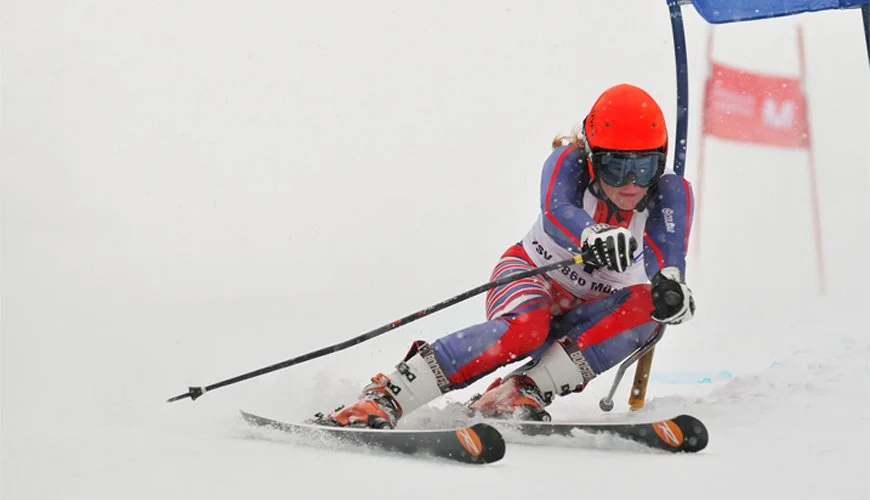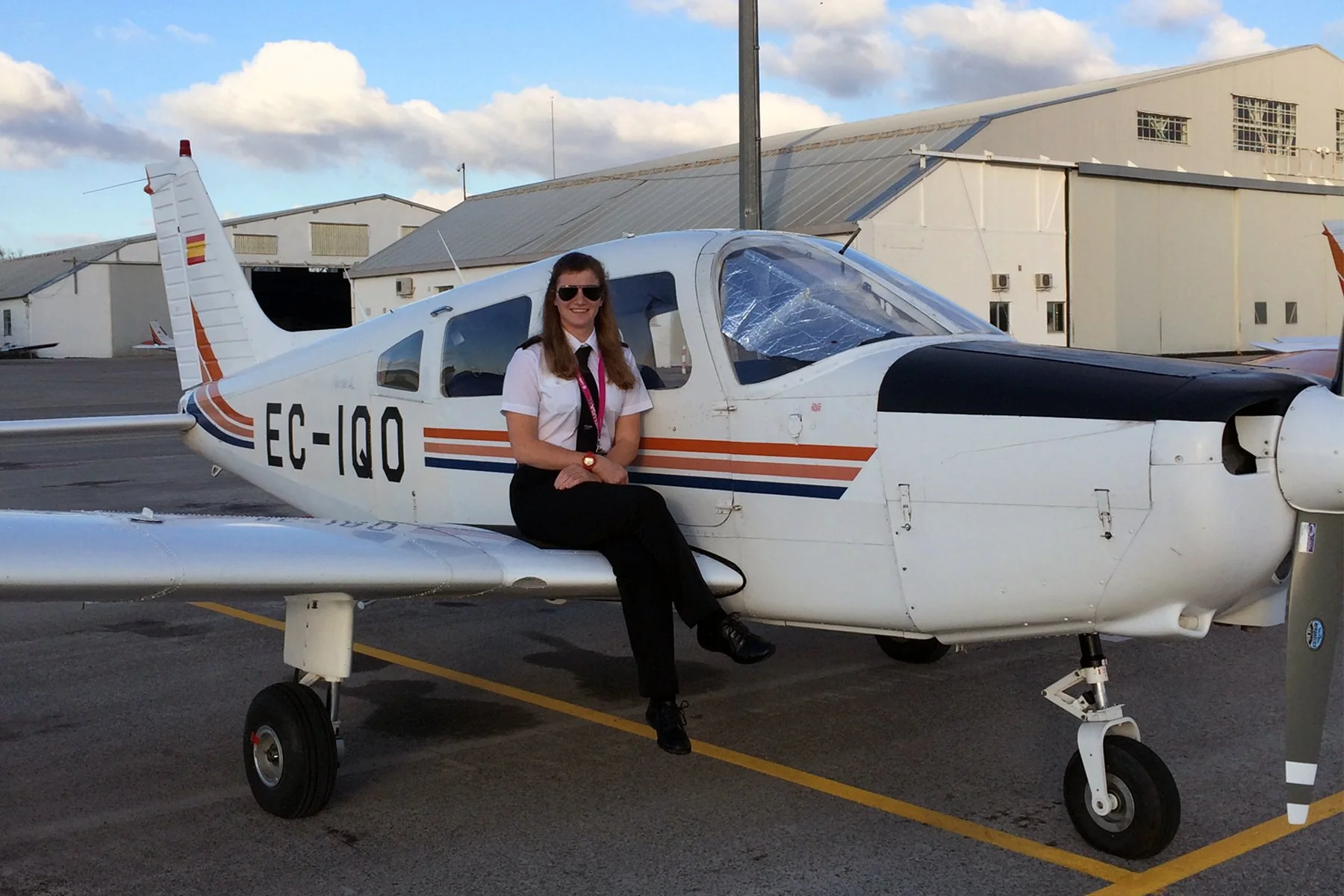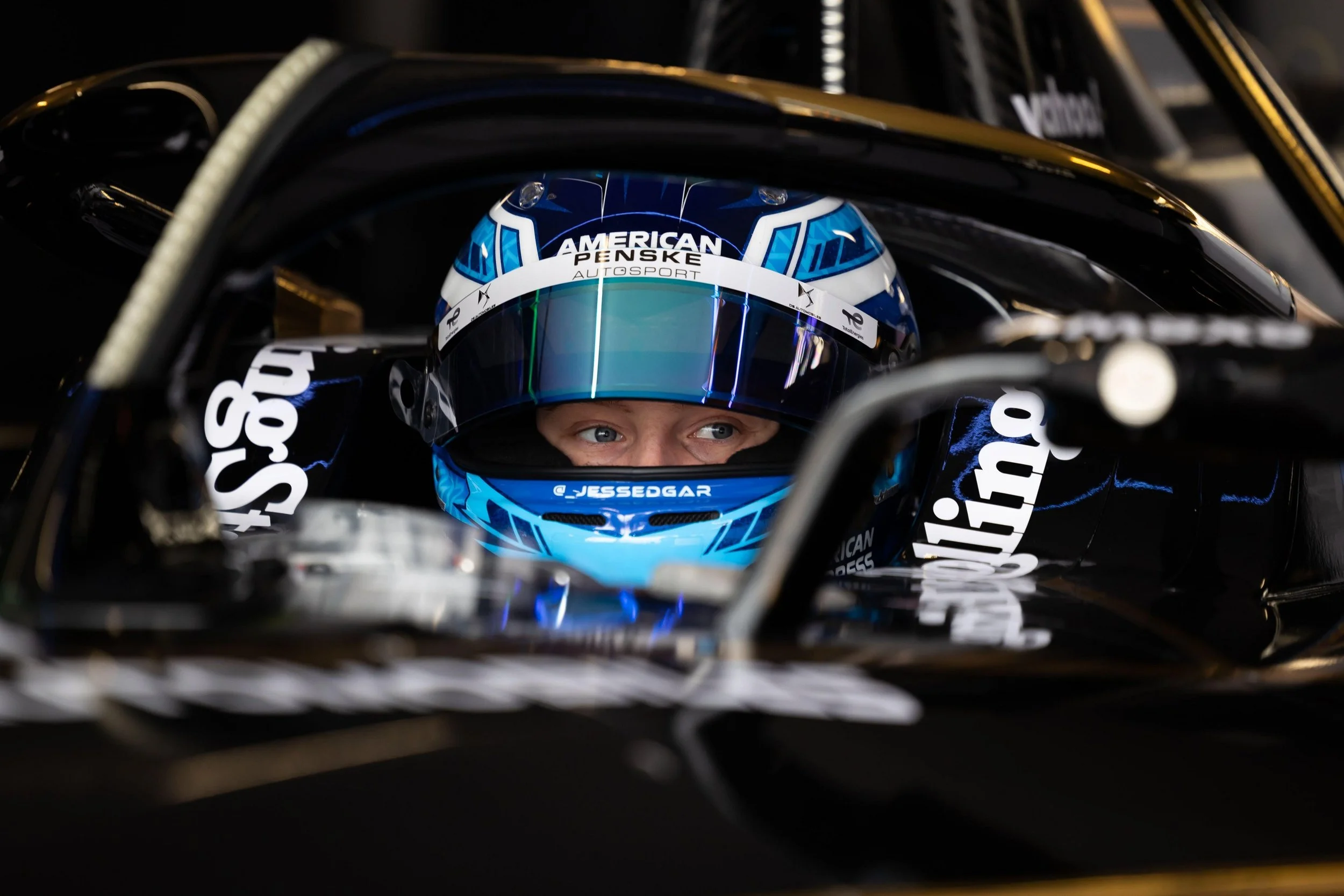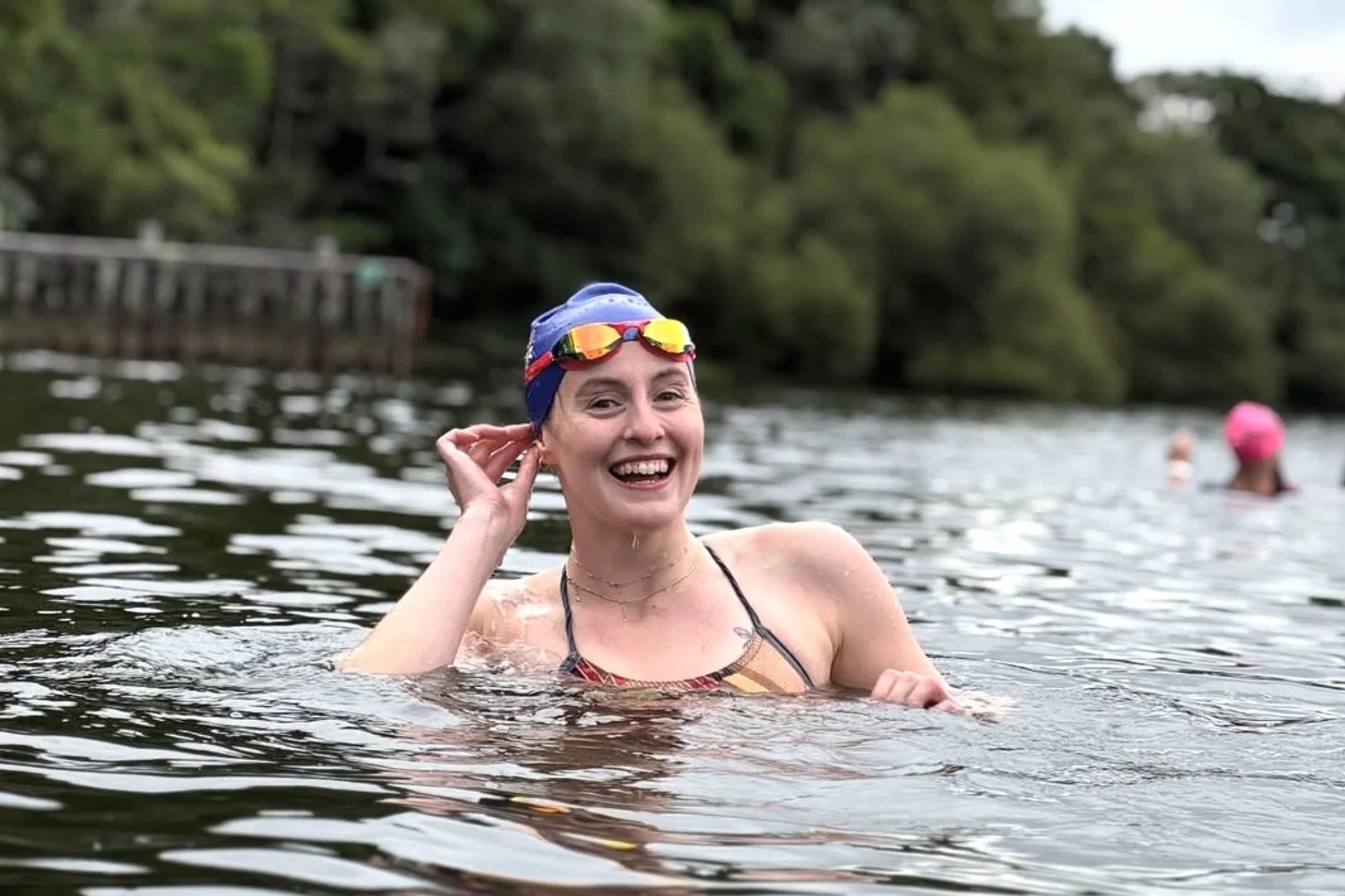Cutting strings
Rachelle Rogers used the lessons of a skiing career that came to a painful end to navigate an exciting new career path as a commercial pilot
Former Alpine skier Rachelle Rogers spent her childhood chasing an Olympic dream. Today, after an injury and years of compounding professional setbacks led to a painful identity crisis, she has rebuilt her life as a commercial pilot.
Speaking to The 1v1 Project, Rachelle discusses the profound mental work of moving on when your childhood dream ends, the emotional toll of elite performance, and the idea behind a crucial peer support programme designed for athletes who struggle in silence.
At six years old, watching local ski club members glide past in their snowflake-emblazoned jackets, Rachelle made a decision that would shape the next decade of her life.
What began as a simple desire became an all-consuming pursuit to become an Olympian – one that would eventually teach her that the most important victories have nothing to do with results.
“It felt like you were just an athlete, and all that mattered was performance, performance, performance... outcome, outcome, outcome,” Rachelle reflects. “Nowhere did it address the human underneath.”
“All that mattered was performance, performance, performance... outcome, outcome, outcome”
Making of an athlete
Rachelle’s path into competitive skiing was unconventional from the start. Her mother skied while pregnant with her and even flew on planes – “with hindsight, that’s an interesting one,” she laughs. But it was childhood holidays in France that sparked something. When the lifts closed each day, Rachelle would throw temper tantrums, unwilling to leave the slopes.
By seven, her talent had outgrown casual ski school progression and she was encouraged to take her love of the sport further. The conditions for joining a serious French ski club were demanding: live the entire winter season in France, speak French, and enrol in a local school.
Her parents found a way to make it work, and Rachelle immediately entered a highly competitive environment that expected elite performance.
“No one was anticipating the little English girl to produce results. I was the surprise of the age group,” she says. “I came out of nowhere and started getting podiums and even winning competitions.
“I was about 10 years old when my potential became apparent to me,” she adds. “From then, I started to take it more and more seriously.”
The structure of French competitive skiing is intense – a hierarchical system of district, regional and national competitions where only the top performers advance. Rachelle excelled. By 14, she was ranking sixth nationally and positioning herself for selection to France’s top specialised sports school.
There was just one problem: she wasn’t French.
Early podium moments sparked Rachelle’s once all-consuming pursuit of becoming an Olympian and competing at the Olympic Games
Caught between nations
At 15, Rachelle faced a tough reality. Despite her ranking, she couldn’t access the French national team pathway. The British system offered no real alternative – no specialised schools or clear performance structure, only ad hoc arrangements that left teenage athletes managing adult responsibilities.
“I was 16 years old, living in a flat on my own with my two teammates. I had to cook, clean, do everything, all while trying to qualify for competitive events as an athlete and study for my A-levels,” she recalls. “It was a lot.”
The dedication should have paid off. By the 2014-15 season, aged 19 and finally free from educational commitments, Rachelle was the fittest and strongest she’d ever been. She’d found an extra gear in training, skiing faster than ever before.
But not a single result materialised all season.
“No one was expecting me to do as well as I did. I was the surprise of the age group”
Breaking point
The 2014-15 season still hurts. Rachelle missed out on qualification for the world championships by the equivalent of less than a hundredth of a second. Later, when she finally had a breakthrough race, skiing well enough to beat athletes ranked far above her, the complex points system ultimately failed to reflect her performance.
“My big goal was the world championships, and I was absolutely gutted when they didn’t select me,” she says. “I really felt no one was fighting my corner on the selection board.
“I didn’t find my motivation again that year,” Rachelle adds. “How can you when these opportunities keep passing you by?”
Then came an injury. Despite recovering from a backseat position – when a skier leans too far back, putting their weight on their heels rather than their feet – the correction drove severe force through her knee. A bruised meniscus ended her season.
Back in the UK for rehabilitation, Rachelle noticed her knee cracking constantly while cycling – a concern for any teenager. Simultaneously, she was delivered the news that she would need to find an alternative path forward.
With no main sponsor to support her ambitions, it wouldn’t be possible for her journey to continue.
“When they didn’t select me, I was absolutely gutted. I really felt no one was fighting my corner”
Parachute strings
Rachelle started seeing a counsellor in an attempt to navigate how she was feeling. In one session, she developed a visualisation. She saw herself skiing down a mountain, weighed down by strings attached to a parachute.
Each string represented mental baggage, like chasing perfectionism, trying too hard, letting people down. None were physical or technical limitations, yet each felt insurmountable.
“I realised that to ski my fastest, there were things I had to let go of,” she explains. “I came up with this idea that everything holding me back was like a string on a parachute. That’s when it hit me – I didn’t believe I could let go of any of those strings.”
During this period, she was exploring alternatives. Her attention pivoted to aviation – specifically, a potential career in the RAF or as a commercial pilot. From attending open days at flight schools, she learned that pursuing that path would mean abandoning skiing entirely. Flight training required total commitment – there would be no room for a parallel career in sport.
It was all or nothing, and increasingly, Rachelle found herself leaning towards the sky.
In mid-June of 2015, scheduled to attend her first training camp, Rachelle realised she didn’t want to ski. She wanted to fly. But it came at a cost: “I was essentially giving up on my childhood dream, which was to go to the Olympics,” she says simply.
Rachelle threw herself into flight training, a new pursuit that required her to let go of her identity as a skier
Identity crisis
That summer, despite her optimism and enthusiasm about her new direction, Rachelle grieved deeply. Skiing wasn’t just a sport – it was a lifestyle that had defined the very person she believed herself to be.
“I was always called the skier,” she explains. “I thought, ‘Who the hell am I now? Who is Rachelle?’ I didn’t know. I didn’t have the answer to that question.
“I was really excited about where I was going, but I cried a lot. I’d be in tears in the middle of the night thinking about what I’d lost.
“Because of the nature of the sport, skiing isn’t something I could continue to do even as a hobby,” she adds. “When that’s taken away from you, what do you do?”
But flight school offered little time or space for contemplation. Starting in January 2016, Rachelle threw herself from one extreme environment into another. The intensity was familiar, but soon she realised she’d brought more than just her work ethic with her – she was carrying a damaging lesson from that final season of skiing.
“When I doubted myself, everyone would say, ‘Yeah, but you’re working really hard, you’ll do well,’” she recalls. “I was firm in saying, ‘No, I won’t’ because that’s what I’d learned the previous year. I worked my hardest and had zero results.
“A really good friend and mentor helped me work through that. He could see that underneath the athlete was someone who simply needed some guidance to navigate a new life away from sport.”
“I was always the skier. I thought, ‘Who the hell am I now? Who is Rachelle?’”
Learning to be enough
Eventually, flying taught Rachelle something skiing never could: you don’t have to be a master. You just have to be proficient.
“Whether you have 15,000 hours or 500, in that moment, you’re enough,” she says. “You don’t have to be the best. That’s very different from being an athlete.”
It was a shift that didn’t come easily. In her first 18 months as a commercial pilot, despite performing well in training, she struggled. The aviation industry has evolved its training approaches in recent years, but at the start of her career, older methodologies were still in place.
For Rachelle, this early style echoed difficult experiences from her athletic past – reinstalling those feelings of never being good enough or worthy.
Yet what sport had given her was waiting to be unlocked. Gradually, Rachelle began drawing on those hard-won skills gained through skiing – resilience, focus, comfort with failure – realising the strength she’d gained from leaving behind everything she’d built since she was six.
“I’ve grown comfortable with failure,” reflects Rachelle. “I am only human, and failure is an inevitable part of the journey. It offers some of life’s greatest lessons in building resilience, compassion and empathy.
“I look at my skiing career and, on paper, I view it as a defeat,” she adds. “But along the way, I won all these skills that have helped me move forward into a new chapter.”
Flying has taught Rachelle that proficiency, not mastery, is the key to both professional success and self-acceptance
Safety net
In 2019, Rachelle met British swimmer Amber Keegan, who later went on to establish Athlete Interactions. Both had served on an Athlete Advisory Group, and both recognised a gap in the support system for athletes.
Rachelle had come across pilot peer support programmes – initiatives created after a 2015 incident where a co-pilot deliberately crashed an aircraft into the French Alps. Aviation authorities subsequently realised that pilots often masked mental health struggles for fear of losing their jobs. Peer support offered a safe, accessible entry point before seeking professional help.
“Maybe people aren’t comfortable with professionals,” Rachelle explains, “but maybe if they talk to a peer, they might then be more inclined to get the help they need.”
The parallel to sport was obvious. In team sports, athletes compete for spots against their own teammates. In individual sports, training partners are also competitors. This intense environment fosters a culture where self-protection becomes instinctual, making genuine openness a professional risk.
“The ability to be vulnerable with somebody else in the same way you would as a friend – it’s not really possible in sport,” Rachelle says. “You’re always going to hide stuff.”
She reached out to Amber with a proposal to create a space where athletes could speak to other athletes from completely different sports, with no competitive overlap or judgment, just understanding. An initiative run by athletes for athletes.
The Athlete Support Network launched, offering exactly what Rachelle had lacked during her darkest moments – someone to talk to who understood the athlete experience without being wrapped up in the competitive sphere.
“The ability to be vulnerable with somebody else in the same way you would as a friend – it’s not really possible in sport”
New foundations
In her flying career, Rachelle has made a conscious choice not to let the identity of pilot define her the way skier once had. It’s a lesson learned the hard way, and one she has been fiercely determined not to repeat.
The mental baggage she couldn’t let go of years ago has since become a powerful reflection: those parachute strings serve to illustrate just how far she’s come.
“If I look at where I am now, I’ve grown through it all,” Rachelle acknowledges.
“I’d love to put my current head on my 19-year-old self and see what she could achieve, but that’s the beauty of hindsight, right? That’s part of growing.”
That growth is now the foundation of her professional life. Having survived her harshest failure, Rachelle has a clearer sense of who she is as she prepares for the most significant evolution of her aviation career: becoming an airline captain.
“I want to take the good parts of the athlete and the good parts of the human into who I will be as a captain,” she says. “I want to lead from a place of connection and grounding, leveraging my own journey to cultivate a truly compassionate team.
“Everything is starting to weave together,” Rachelle ultimately reflects, “and I’m excited for where it’s taking me.”
Rachelle Rogers
FEATURED STORIES










